#the argument should only rely on narrative reasons
Text
ok i can't find it but do we remember that post that was like "jjk hoes vs. naruto hoes, no powers, no weapons, who wins" i have not stopped thinking ab it so:
jjk v naruto (from the perspective of a power-scaling anti)
nobara vs. sakura: nobara bodies sakura, kugisaki is crazy in a way sakura cannot compete with. nobara will fight dirty and to the death i don't think sakura could handle it. nobara would tear her down mentally too in that evil gay way she does, it will end in tears one way or another
megumi vs. sasuke: megumi loses becuase he doesn't try, sasuke has everything to lose (prideful ass) megumi doesn't give a shit about this man and will not put in the effort for a fair fight. in a fair fight i lean sasuke anyway, no real reason just vibes
yuuji vs. naruto: yuuji is like a little god man or smthn? technically so is naru but that's w/ mystical magical family shit. itadori's body is like fucking innately insane strength wise, naruto would fight tooth and nail but itadori built like a freak and that twink does stand a chance
gojo vs. kakashi: i could not tell you, i lean gojo cuz i'm biased... but like... bro. tbh i don't think they'd fight. that's too much sad homosexual energy... theyd fuck for sure
#no arguing ab power scaling#the argument should only rely on narrative reasons#and they should be stupid#gojo and kakashi be like: dead boyfreing#jjk gojo#jjk#gojo satoru#megumi fushiguro#jjk yuuji#nobara kugisaki#sasuke uchiha#i haven't seen a naruto in like three years so dont take this shit serious#i cant prove naruto isn't a twink#naruto#sakura#naruto and yuuji's main character armor hitting eachother would be fun to watch#i will say only one side of this fight has dead competitors#kakashi and gojo locking eyes recognizing they're like the same and making out just feels right#why fight when u can go fuck yourself
28 notes
·
View notes
Note
Do you think the god debate and narrative around it in C3 would be more compelling if Ludinus only focused on killing the Betrayer Gods a la Cassida? As many pointed out, the impact that Primes have on mortals is largely positive. Aside from cool abilities, they give healing, meaning and comfort to their followers. Up until very recently (Braius) we haven't seen Betrayers do much of that and their followers are, more often than not, people who would cause great harm to others.
I actually do not. There's multiple questions in here, and honestly I could probably write 5000 words on any of them, which I'm not going to do, but I will split this up into components.
First: I don't think Ludinus is the problem at all. He is unambiguously the villain, but he is always narratively compelling. It is fun to make fun of him because he is genuinely a fantastically crafted villain. When I dunk on villains who are boring, it's nowhere near as fun because all you can say is "wow what do you even do. boring-ass" whereas Ludinus is full of interesting possibilities and hooks to be like how can you be so smart and have lived for so long and seen so much and come to the fucking worst conclusions. There's a reason why people have been side-eyeing him consistently since at least his first speaking appearance in Campaign 2, if not his first appearance ever, in Felderwin, and it's because he's a great character who I hope dies horribly. So his motivations are fine. I'm not saying the possibility you suggest wouldn't be a very interesting different story, but my complaints about narrative and the gods debate do not require anything different from Ludinus, who has been a consistent bright spot within the muddied narrative by being a consistent blot on Exandria and also sometimes the moon.
The narrative and the god debate are intertwined - the issue is a dull indecision that plagues both of them - so I'm splitting this one up a little differently.
What do I as a viewer think is the most reasonable stance regarding the gods based on my understanding of the worldbuilding of Exandria?
What is interesting to watch?
And therein lies the problem. I, as a viewer, think that killing the gods is a bad idea, and I've articulated this in various spaces and am not going to write another 5000 words about it right now, but between the events of past campaigns; the events of this campaign including Downfall; who within the narrative supports the choice to not kill the gods; and the complete uncertainty regarding the fate of existence let alone mortaldom should they be killed or chased away I have come to this position. Any counter-argument tends to rely either on entirely false statements, or a nebulous "a better world is possible" without any assurances that the allegedly better world is, in fact, probable. Ironically enough, I am not willing to take a leap of faith.
But as for what's interesting to watch? That's an entirely different story. My issue with the the gods debates is that they are endless, circular, indecisive, and between the least informed group of PCs we've had by a large margin. They say the same 5 sentences in different words over and over. It's like watching a bunch of high people while you're sober. It only hits hard if you're stupid. For more on this see here and here. If Bells Hells had decided 30 or 40 episodes ago to side with Ludinus, or to try to only kill the Betrayers, or to oppose Ludinus but kill the gods? Great. Fantastic. I'm not saying I wouldn't have had my critiques of it given the worldbuilding setup as described above, but I think it would have held up infinitely better as a standalone story, at least, than it does now. My problem is that instead they had endless circular indecisive conversations during a bunch of (comparatively much more interesting) fetch quests, finally came to some kind of conclusion that gave the end game some structure and direction like 4 episodes ago, and then had yet another wrench thrown at them. And convention panels and Cooldown have consistently confirmed my suspicions about the lack of planning in the places where this campaign really needed it. In my conversations after the latest episode, multiple people independently used the term "sludge" to describe their feelings about the plot.
In actual play, I want characters who have clear conviction and make bold and decisive moves because handwringing forever in such a slow-moving medium is excruciatingly boring. Like, do I think Percy in the Briarwoods arc is making good, informed decisions that make him a moral person? Absolutely the fuck not. Do I think the story where he's shooting first and asking questions later is infinitely superior to one where Vox Machina can't decide what to do for 50 episodes? Yeah.
The god debates are ultimately a symptom of this narrative aimlessness. The lack of an answer is the problem, not what the answer is.
#answered#partner-of-the-light#critical role#cr discourse#i have maintagged this because i think it is something that hasn't really been articulated#i think tbf most of us have been sucked into the gods debates too but like. the problem is that this is still a debate in episode 107
124 notes
·
View notes
Text
on morality & madeleine: interview with the vampire meta (written after s2e6)
so far, i’ve found that trying to process my thoughts on madeleine feels really difficult when everyone online has their own opinions and their own biases. this post is kind of my attempt to sort out how i feel about her, and to refute and explore some arguments i’ve seen pop up in her tag.
i think the people who are pointing out that first and foremost these are fictional characters have it right: they’re not real people, their relative morality is only relevant as it pertains to the story itself. and in a story like interview with the vampire, your baseline is that every main character is a killer. in terms of morality, evaluating whether or not a character is a good person is pretty useless and also just… isn’t the point of the story. all characters are functions of a narrative, all characters are tools that you use to tell a story. their morality should not be judged in the same way as you would a real person’s! now. all that being said, let’s have some fun judging* madeleine anyway!
*doing some of my own biased character analysis on
what we know comes to us from a few sources: claudia’s diary, which daniel can read, (decent primary source, but filtered with her biases), louis’s recollection of madeleine’s memories (secondary source that relies on both of their ability to remember clearly) and presumably, louis and armand’s recollections of their interactions as well, which isn’t a whole lot to begin with.
part 1: the nazi fucking
when madeleine talks about sleeping with a nazi to claudia, she’s extremely casual about it. while she notes he brought her food, and cigarettes, she says in a way that invokes a courtship ritual, rather than a direct bribe. it’s impossible to divorce this from the context though: her neighbors are starving, and she was brought food. it likely was a bribe, but what’s important is that she doesn’t relay it as one. her focus when she starts talking about him is on the connection: “it was the comfort, the proof of life,” as she says. if she had been coerced, or if she felt like she had no choice in the matter, i think she would have presented it a little differently. but her affection for the guy is clear, and she even mocks him a little to claudia. in her own words, “i wasn’t inviting hitler to stay in france, i was inviting a frightened boy to cradle my tits.”
which. let’s be real here: to claudia, she is downplaying it. she slept with an occupying soldier during an occupation. watching this scene for the first time, you could even reasonably assume she doesn’t get how serious that is. but once you see the degree of punishment she faced, and continues to face for her actions, you realize her framing here is a learned defense against genuine violence. she feels she has to downplay it to herself and to claudia because there is an imbalance here. it becomes harder to admit to your wrongdoings when the punishments you face for them feel wildly disproportionate.
madeleine did something she never should have done, something she doesn’t feel remorse for, but something that she’s being punished for in a way that far exceeds what any person deserves.
when she talks about it to armand, her framing changes again. she calls it a love, still, so the affection is still present, but she places a greater emphasis on doing what it takes to survive, implying more so that sleeping with a nazi was an act of self-preservation. regardless of whether this is more true than how she presents things to claudia, she has a motivation here too.
when she shares her experiences with claudia, she’s flirting, trying to make her laugh, trying to make a connection, and this part might be subconsciously, but she is certainly trying to get claudia to like her. when she talks to armand, however, she’s actively trying to convince him to grant her the dark gift. she has to portray herself as capable, as self-sufficient, and discerning, and it works! even though he denies her based on his own biases, armand is visibly impressed by all of madeleine’s answers to his questions.
and all we get from louis was that the experience was sweet. and let’s be real, it did look pretty sweet.
i don’t believe madeleine has any hatred for the boy she slept with. i don’t think there’s any evidence she has any hatred for jewish people either, or for her country, which her neighbors believe she betrayed. i think she chose to prioritize a moment of human connection (and possibly food) over the greater consequences of her actions.
i have been looking for the post again since i saw it, so if anyone sees it lmk! but! the op talked about the fact that madeleine as a collaborator isn’t changing her behavior in any meaningful way now: she watched claudia kill in front of her, and instead of running, she once again invited the danger in, joined up with it. i believe the post said something like: once a collaborator, always a collaborator.
this has really stuck with me and i really wish i could reference it properly.
cuz i think there is something there—i think madeleine’s self-preservation instinct is a little screwed on wrong, i think she is acting similarly with claudia as she did with the nazi, but i think it’s not just about the danger. portraying her choice to follow claudia as a cold moment of choosing survival takes away from her complexity, and from the veracity of her feelings for claudia. so, not just the danger. i think it’s about the connection again.
the connection she has with claudia is real, the love she has for claudia is incredibly real. but madeleine is once again prioritizing an interpersonal connection over anything else, and that is the pattern she’s repeating here.
part 2: the apparent age gap issues
every single person who says their relationship is problematic because claudia is a child owes me and claudia fifty bucks.
i don’t really even want to get into that because i don’t think it’s worth my time. the show has put a lot of effort into demonstrating that claudia is an adult trapped in the body of a teenager, and that experience is hard enough on her without all you people insisting she’s still a kid anyway.
however, there’s a secondary argument i’ve seen which i do want to address, which is madeleine’s perception of her.
in their first meeting in the shop, it’s clear that madeleine is seeing claudia as a teenager. she calls her one directly, and references her “body about to bloom” when they meet again two years later. however, when they do meet two years later, claudia has not grown. we know madeleine has noticed this by the dress fitting scene for certain, but it wouldn’t be unreasonable to assume she noticed that sooner. additionally, in the same breath, madeleine also references claudia’s “mind of a sophisticate.” by the time claudia tells her that her growth was stunted due to the war, it’s extremely likely that madeleine had already reached a similar conclusion. she doesn’t look surprised at all when claudia says it, and it’s because claudia seems like an adult. even if she doesn’t look like one, she carries herself like one, she makes conversation like one, and it’s very easy for madeleine to accept the reality that she is one, because she may have suspected as much already.
the reason i say all of this is because i’ve seen multiple people saying it’s inappropriate for her to flirt with claudia before she knows she’s an adult.
is their interaction at the shop window flirting? are they flirting outside the theatre, just after the play? both of these scenes are before claudia says her growth was stunted. i think it’s impossible to say they were definitively flirtatious, but i will certainly say there was a vibe. and i think that’s… kind of fine actually ? two people can have chemistry and it doesn’t have to mean anything about them morally. and my coworker andy said it would have been weirder if they had no chemistry and then did suddenly after madeleine realizes she’s an adult, which made me laugh, and which i think is correct. i like the way they get along before the dress fitting, i think those scenes are fun, and the ambiguity of the flavor adds to it.
i did see at least one post that said it was inappropriate for madeleine to talk about sex frankly with claudia if she thinks she’s a teenager, and to that i say. you can talk to teens about sex. even if she didn’t suspect claudia was older, it’s still fine. they are friends, and she’s sharing an experience she had because claudia asked her about it.
additionally, it’s both a very contemporary & a very american idea that People Under 18 need to be kept from conversations about sex. frankness about sexuality is in fact, very french lol.
i did originally think that this was after the conversation about claudia not growing, but i just watched the scene again to be sure and it was, in fact, also before, but i think my point stands.
i don’t know for certain if she intended to come across as flirtatious in these scenes, but i know something clicked for her right around her confession. you can see it, when they lock eyes in the mirror, that whatever the vibe is, they’ve both clocked it. and she finds out claudia’s older than she looks only seconds later, because she’s the one pointing out that claudia hasn’t grown. (but, yes, i’ll add anyway: after claudia says her growth was stunted, and after that moment of connection, madeleine’s expressions do seem a lot more… Interested too, lol).
i understand and i empathize so much with people’s criticisms of madeleine’s past. i have no intention to exonerate her in that regard (other than her previously mentioned narrative tool status) but i will jump to her defense when it comes to her relationship with claudia.
madeleine sees claudia as an adult, because claudia is an adult.
if they weren’t vampires, and if they weren’t queer in the 1940s, maybe she’d be worried about how others saw their relationship. or maybe it would be weird if she didn’t care how it looked. but given that the only people who will know they’re romantically together are other vampires, i don’t see her lack of concern for the optics being that much of an issue either.
and the reason she’s not concerned is because she knows what claudia is to her. which brings us to:
part 3: the sister stuff
once again i think the show does a pretty good job of refuting this one on its own, but i’d like to get all my arguments in the same place.
so. i see “don’t worry about the blood, it’s the blood that made you,” getting thrown around a lot as proof that madeleine is replacing claudia as her sister.
why would they have a scene that directly refutes this if they were true? when louis asks if that’s what’s going on, claudia says they already “had it out,” and madeleine clarifies that claudia is nothing like her sister, and cannot be a replacement.
“don’t worry about the blood, it’s the blood that made you,” is something that madeleine says because she loves claudia, because she loves the person and the vampire that she is. because she wants claudia to know that her past does not define her. because she wants her to know she doesn’t feel tainted by it, and that claudia doesn’t have to either.
and yeah, it’s not that there’s zero incestuous tones to it! or to the whole arrangement, certainly. but i think any that are there pretty neatly fall under the “iwtv typical wire crossings” flavor rather than the “you’re my dead sister’s replacement” flavor.
so, yeah. despite saying fictional character morality doesn’t matter, i’ve just written several paragraphs trying to figure out if madeleine is a good person or not. really, though, that’s not the question iwtv wants us to ask, or the question i really want to ask its viewers either. is madeleine a good person? eh, probably not. is madeleine a good person for claudia? absolutely.
on this, iwtv is extremely clear. madeleine is an ideal partner. she’s not scared, she’s not surrounded by friends and family she’d grieve, she’s weirdly suited to vampirism, and she loves claudia so much. they share a morbid sense of humor, they’re comfortable teasing each other, they communicate in an extremely healthy way, and every single step of their relationship is based on consent.
the entire time i was watching her scene with armand, i just kept whispering, “oh my god, she’s perfect.” she nailed absolutely every question because she’s perfect for what she’s supposed to do as character, as a function of the narrative she is a part of. madeleine is perfect because she is perfect for claudia.
#i am going to be DEVASTATED if the ep comes out and i’m wrong about any of this#but mostly i’m going to be devastated if it goes the way it seems like it will#iwtv#madeleine iwtv#madeleine eparvier#madeleine éparvier#claudia iwtv#claudeleine#interview with the vampire#thank you to violet mo amsel andy bee and also bee#for helping me get my thoughts out and clear!#if you've seen s2e7 don't talk to me about it yet <3 im gonna watch it tonight#claudia de pointe du lac#claudia de lioncourt#claudia éparvier
72 notes
·
View notes
Text
So with Hazbin Hotel finally releasing in just a couple more months, I thought I’d talk about what might be the biggest underlying question a lot of us have:
How much, if any, crossover will there by with Helluva Boss?
Now to start with, despite Blitzo and Moxxie having originated conceptually as side-characters/villains in Hazbin, I think we should NOT be expecting any kind of major or even minor appearances of I.M.P. in Hazbin Hotel. And frankly, I think that’s a GOOD thing. These two shows really should be allowed to stand on their own without relying on any kind of crossover/cameo appeal. Not to mention that these two casts of characters don’t really have much reason to cross over, given that they occupy pretty different circles. Like just the fact almost all of Hazbin’s cast (human Sinners) are confined to the Pride Ring of Hell while Helluva’s cast are often traveling between the various rings and even going to Earth kind of limits the potential points of interaction. All in all, despite how much many of us might hope for it, I think we should be expecting appearances from the I.M.P. crew in Hazbin Hotel. Though barring one, VERY SPECIFIC possible scenario I’ll dive into later.
Instead, the potential crossover between these two shows that I’m actually very curious about comes not from Helluva’s main characters, but rather from some of the supporting cast.
Specifically, I’m very curious if we’ll get cameos from the other Sins.
Because whereas Blitzo, Moxxie, Millie or even Stolas run in entirely different societal circles than either Charlie or the Sinners she’s trying to help, with the Sins it’s an entirely different situation.
Not only are the other Kings of Sin we’ve met the fellow rulers of Hell alongside Lucifer, we’ve also gotten implications that they do see each other more or less as family. Which by extension, could very well mean they are family to Charlie as well. Basically, Ozzie, Bee, Mammon and the rest could absolutely be presented as Charlie’s aunts, uncles or cousins, depending on whether Lucifer is an ‘older brother’ or outright ‘father’ to the group as a whole.
Which all taken together means that the Sins actually have all the reason to make an appearance or two in Hazbin. Like we know from the trailers that we’re going to have a flashback to Charlie’s childhood of her spending time with her father. Imagine how cool it would be if said flashback included a couple cameos from the other Sins?
Obviously I don’t think we should expect Asmodeus, Beelzebub or any of the rest to be any kind of major recurring presence in Hazbin Hotel, especially when we consider that the vast majority of the action of Hazbin is going to be locked to the Pride ring. But it does feel very natural or even outright necessary to the narrative that they make an occasional appearance. Particularly when we consider that it’s pretty much inevitable that Hazbin dives into the backstory of Lucifer, Lilith and the creation of Hell as a whole, at which point it would be pretty weird if the other sins DIDN’T show up in some major capacity, especially if they are indeed fallen angels like Lucifer.
And of course I think we can all agree that it would be pretty awesome just to see any of the Sins show up in an episode of Hazbin, even if whatever they’re doing is largely unrelated to the events of Helluva Boss. Like imagine an episode or arc where Charlie and Vaggie have a big argument, and Charlie ends up getting advice from ‘Uncle Ozzie’? Like even if you haven’t seen Helluva Boss, the idea of Charlie getting relationship advice from the King and Embodiment of LUST is hilariously surreal on its own, but the fact that it would almost certainly be actually GOOD advice just makes it funnier. While those who have seen Helluva can appreciate, among other things, the parallels between Charlie’s relationship with Vaggie and Asmodeus’s relationship with Fizzerolli.
Now with that all being said, as I alluded to earlier there is ONE specific scenario where I can see the I.M.P. crew making AN appearance in Hazbin Hotel:
Given the fact that Blitzo and Moxxie did originate as Hazbin side-characters, I do think it wouldn’t be surprising if we got an episode of the show meant to pay tribute to this fact. Basically have an episode where Blitzo, Moxxie, Millie and Loona show up as one-off pseudo-villains as an episode-long ‘in-joke’ referencing the origins of Helluva Boss and giving the team a chance to give an idea as to what Blitzo’s and Moxxie’s original roll in Hazbin would have been.
Say, Charlie and co. are dealing with a sinner who is particularly fixated/obsessed with ‘unfinished business’/grudge from their life with Charlie trying to get them to let go of that grudge by convincing them there just isn’t anything they can do about it from Hell. Cue perhaps Angel Dust ‘helpfully’ mentioning that he’s heard of some people who do exactly that, or perhaps simply a rather familiar jingle can suddenly be heard over a nearby TV, and we’re off to the races.
Again, more or less doing an homage to what Blitzo and Moxxie likely would have originally been doing as Hazbin side-characters.
#hazbin hotel#helluva boss#hazbin hotel theory#hazbin-helluva crossover#charlie morningstar#hazbin lucifer#hazbin lilith#helluva sins#helluva asmodeus#helluva beelzebub#helluva mammon#helluva blitzo#hazbin hotel rambling
92 notes
·
View notes
Text
Okay here's probably a surprise from someone who like Squalo so fucking much. I actually believe Squalo should lose the rain battle as he does(or if one goes about changing it that he should still lose in the end due to how he is). I will go into it below but it is going to be so fucking long. This is both breaking down the "realism" argument and the "Narrative" argument(though, this battle should honestly only be looked through the latter lens due to that being the purpose of it.) Anyway, let's break it down.
First and for most I'm going to attack the idea that because Squalo is more skilled he should not have lost "realistically", important thing to know, in any realistic scenario Squalo almost definitely would not win.
He is only a threat because of the fact that Yamamoto is new, Squalo's sword is literally without a doubt, shit. I have to be level about this because I hate this fucking thing with a passion because from a sword fighting perspective he has done literally everything wrong with this damn thing.
The only type of blade like this that had been intended to be fought with is a Calvary weapon, it isn't made for melee and genuinely just. Sucks when you use it like he is. It severely limits his options, trapping him to only using the exact same arm with the exact same maximum strength behind each swing, with the exact same maximum length. The ability to switch between one handed and two handed is a massively important thing with swords which is why smaller swords that you can do both with were the most common type. It keeps pressure on your opponent and gives you a much bigger variety of options. Not to mention with how it's attached to his hand in the past and future with what is only bandages in the present, and only a few red straps in the future.
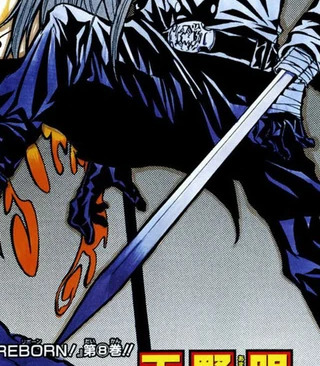

This shit is so god damn unstable it's impressive his sword didn't just fly off when he blocked a hit. Do the same thing with some tape and a ruler and you'll know exactly how quick that blade will shift at the smallest amount of resistance that any strike with it would have landed lighter than intended, and I don't mean lighter in terms of strength behind it(though it would be partially). I mean all his cuts would end up shallow, he'd be incredibly ineffective. This is literally the second worst blade of khr and this one unlike that one isn't made of flame so it has no excuse(apologies this sword pisses me off to no end). You have to fundamentally change how this fucking sword is built for it to be even fucking slightly good, this ain't it chief.
Next, here's a major things, there is a reason there is a saying "The first best swordsman doesn't have to to fear the second best, he has to fear the beginner" because it's fundamentally true. Squalo would never fear fighting another master because masters have all become set in their ways, their techniques, you can read them and break into their weaknesses. But, Yamamoto isn't a master, and throughout the battle, he is evolving rapidly. Squalo by the end of the battle relies incredibly on the things that he had seen before, he threw out his caution because he "seen it before" by the point of Yamamoto throwing out the eighth move.
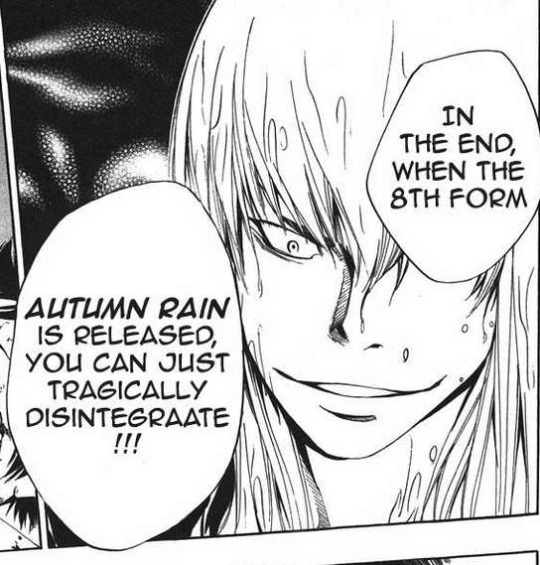
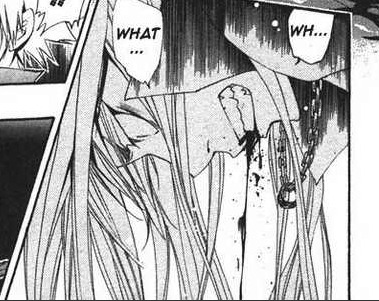
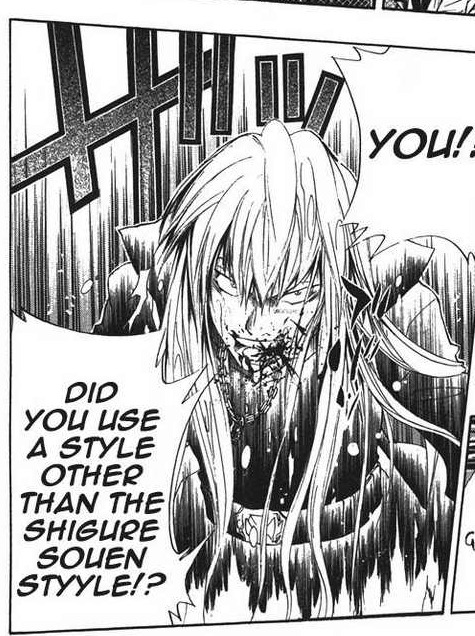
Squalo had grown too used to being able to read his opponent that when he saw Yamamoto going for something new, he instead relied on things he's seen before, things he expected, a surprise attack, which was his downfall, he had stopped taking Yamamoto seriously after the 8th form.
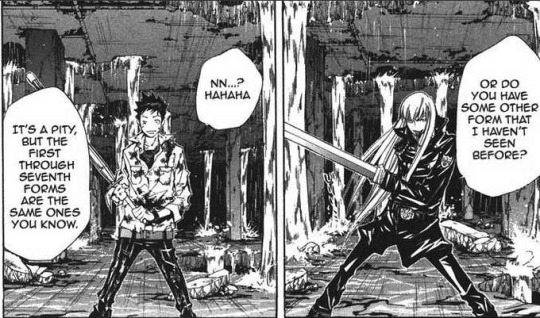
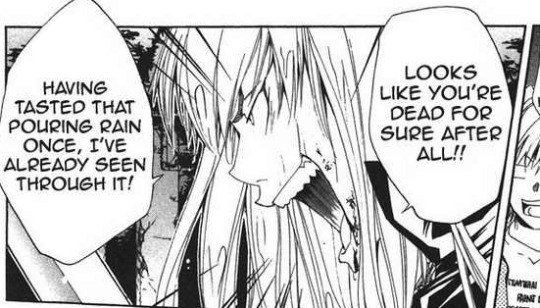

He had prosthetic, to snap backwards in case of sneak attacks, because he expected this move so much. When something wasn't as he expected he defaulted to this and the reflection on the water convinced him of it.


You can't read a newbie and that's what's the most terrifying thing for a master to fight. In fact, it's implied that Squalo beat Tyr the very same way as Yamamoto defeated him. It's stated that in the same battle as Tyr that he perfected his current style, meaning all of his techniques, but notably they say scontro di squalo is in fact what was used to defeat Tyr. It implies the sense that he created it during this battle, but what I find interesting about scontro di squalo, is that it's just flailing his sword around as he runs forward. This would be a move, only someone new and desperate would have come up with in reality.

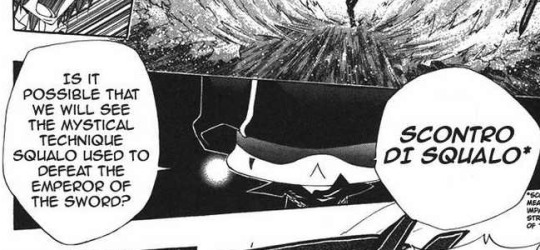
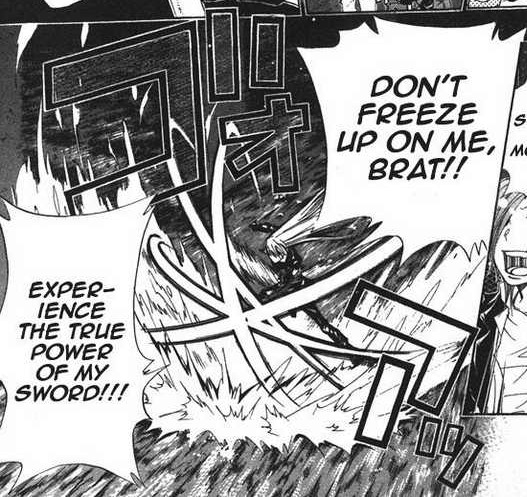
It would throw off any master because of it's sheer recklessness. But once again, Yamamoto isn't a master and thus it's major advantage, is lost. Regardless, Squalo used to do the same as Yamamoto did and that's how he won there, but he made the mistake of believing his move set as perfect thus stagnating afterwards. His pride in his success and abilities, were his downfall in this match. Additionally Squalo's pride affecting his fighting was evident, in sword fighting you never dodge if possible it's really bad to because typically, you will not fucking succeed. Your legs are last in the orders of operations it's generally better and safer to block, parry and counter your enemy than it is to dodge. The fact that Squalo dodged a strike he knew was coming shows that he was over-estimating his own abilities and understanding of this style.
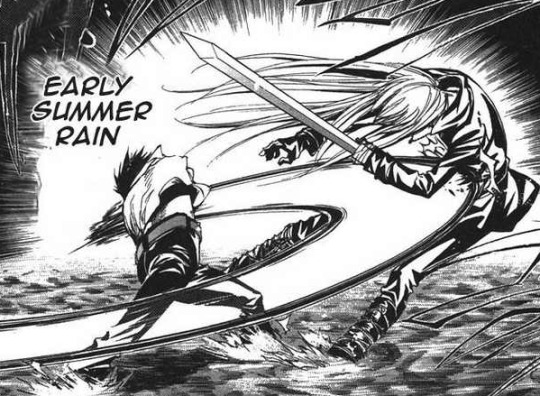

Finally the argument that Yamamoto would not be as strong as squalo is. Incorrect. In fact baseball actually engages the same muscle as sword fighting, and terrifyingly, there's one difference people do not typically account for when cross examining weapons. Which is, blunt objects naturally need more force behind them to do their work, while blades will typically have less resistance against the body. This means Yamamoto likely has a much higher swing strength than Squalo does with how violently he plays it, Yamamoto is like on, 'exploding a bird with a baseball pitch' level of play, and that WILL go into his swings.
If we were being realistic, should have broken Squalo's bones several times over with his back of the sword hits. It should be noted, the back of the sword while an anime trope of not being as dangerous, is actually just as dangerous or more so especially in the hands of someone used to using a blunt type of weaponry(in this case a baseball bat) the thin metal is heavy and powerful enough that the pressure on it would instead focus all the energy there, causing heavy bruising in the best of cases and something to break in the worst. Yamamoto's final move against Squalo, should it have hit his neck could have completely paralyzed the man from the neck down, or if it hit his skull, could have easily cracked and caved it in, and that's not bringing the additional momentum from it being a a strike with power added to it in the air. It is that bad. Notably, in the manga it appears Yamamoto switches the blade to the flat(not the back, this is the wide part of the blade) halfway through the strike so that it hits like that on the impact.
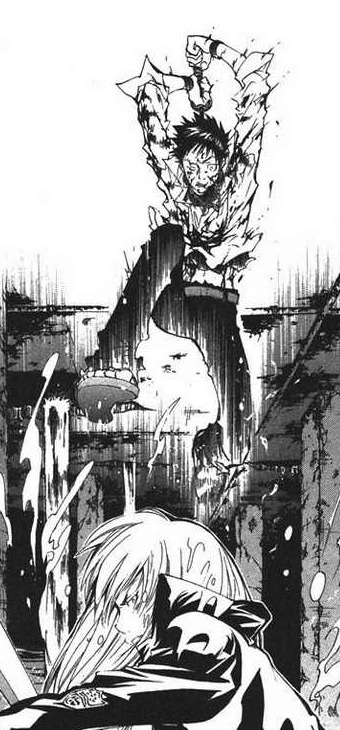
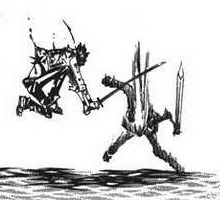
While this does typically lessen damage, it's mostly because striking like this creates more air resistance and slows down the blade before impact. However switching like Yamamoto does cuts down the slow and it would in fact do a lot of a damage. As even when it has more air resistance, a strike on the head like this is typically at minimum hard enough to stun a person. Which does explain why Squalo wakes up a few seconds after. But regardless, Yamamoto is perfectly capable of wrecking Squalo's shit even without physically training for the sword(which he did in fact do before this too but you know) in fact the fact he didn't kill Squalo in this match is impressive.

I want to additionally note the above, that Yamamoto's sword in the manga after is warping up and down like a door stop with so much energy put into it. Swords do wobble a bit when hit like this they have a bit of bend. But not THIS much typically. With the amount of force you'd need to do this to a sword you're more likely to fucking shatter it, now imagine doing that with solid metal against someone's fucking HEAD. The only thing preventing Squalo from dying from that is well the fact he is a cockroach and can't fucking die.
Now that we got that out of the way, we will now be looking at what type of fight this is. Battle manga focuses on battles it's in the name. But the important thing to know, is that there are several types of fights of which they can be categorized. I usually use 3 types(Narrative, Show, and Goal), though they can be mixed and matched but they cannot replace each other. They have different purposes and replacing one with another can in fact incredibly negatively impact how the story flows and character arcs grow, especially if you replace it with a show fight(one that focuses on a. character skills or b. entertainment value). But fundamentally what's important to know, is that the above that I've picked apart doesn't actually matter due to the type of fight it is.
You see, this is what I call a narrative fight(it is also mixed with a "goal" fight.) A narrative fight is something that explores the character and teaches them something that changes their character. It also is set to show something to the audience about the two characters fighting. Not their strength and their abilities, it's about their personalities, beliefs so on, things that can't actually be quantified. Almost all of the Varia arc fights are narrative fights. Fundamentally, in order to achieve what needed to be achieved, Squalo would and should never be able to get his hands on that ring.
Aside from the fact that Squalo would just kill any opponent he wins against if he doesn't have a reason not to(and in the case of the rain battle there's nothing there protecting Yamamoto). The rain battle is a battle of a lot of things. It is to teach Yamamoto humility, it is to show Yamamoto's progress from when he got his ass beat by squalo, it's to show the intense flaws of Squalo's pride, it's to show that insurmountable odds are possible to beat. Remember they're going 1 - 3(due to tsuna losing the sky ring) they're at an intense low point if yamamoto loses it's 1 - 4, which is more than half of the rings. But it's also about change. Yamamoto's entire style is about change. Squalo's isn't. Squalo's is incredibly ridged and stuck as it is.
For Squalo to win is to deny change is important, to say he is completely correct in being a prideful dick. To teach Yamamoto that this is correct, is very bad, because if Yamamoto were to fully follow Squalo in this? He would also stagnate the same way Squalo had. By breaking free of the competitive nature and seeing past the boxes of most sword styles with one that continues to evolve and encourages this. It's a battle of self reflection, and Yamamoto does this looking back over the battle, his last statements of it being flawless and invincible, is not a statement made to genuine belief that it will never change, but is a statement that because it changes it can always become something that will never truly be killed. But it's also something that pisses Squalo off, and Yamamoto is purposely saying it as a response, to goad Squalo into attacking. To blind him with his own pride and rage, to the new changes to the style, for Squalo to not see that Yamamoto has figured something out and isn't just being stubborn.
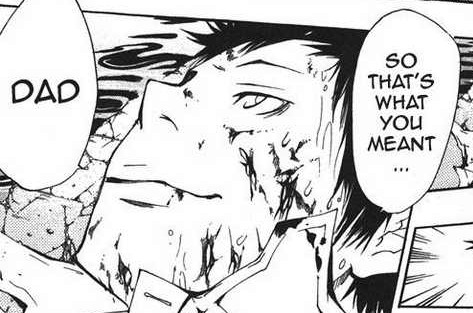
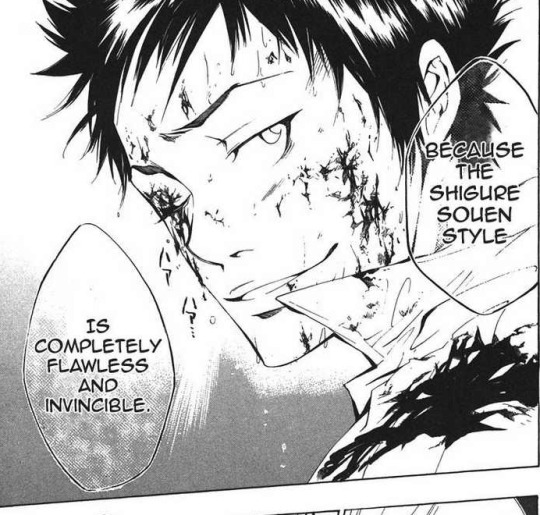
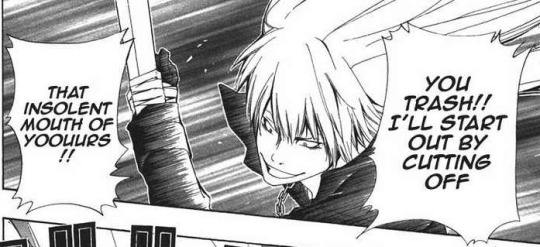
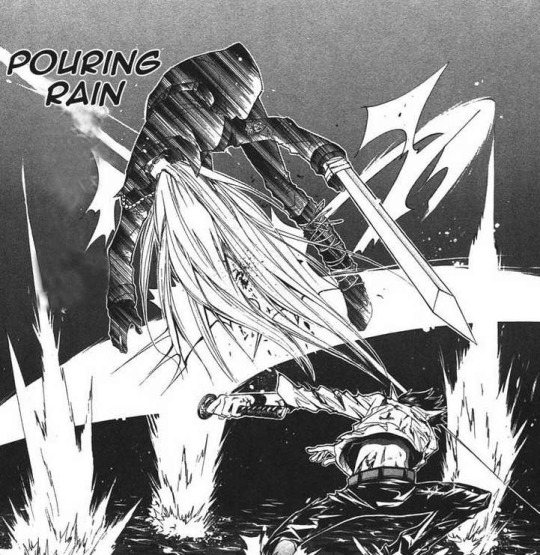
It never mattered who was truly better, because this fight is to double as a lesson. Should Squalo win cleanly or not punished for his pride, for being blinded by it, Yamamoto will not learn to grow. The battle is tailored to this, and changing it without understanding the narrative reasons as to why it ended up this way would ruin it's impact. It's not perfect it needs to be cleaned up a little with some dialogue changes and such, but honestly, the only thing that changing it would succeed in at best is a side grade should you make it so Squalo still loses. Or it loses it's impact should Squalo win.
I love the man I truly do, but this? This is one of the only fights where I will say he should lose. Other fights with him are much more arguably loose on which way they should go, but this? This one is a narrative battle that had complete purpose to his loss through and through. Squalo losing here serves a great purpose. He didn't even learn from it much which is a shame, but not surprisingly due to his character and what he represents. Which may be why he doesn't win any further up, because he does refuse to self reflect in any capacity.
#katekyo hitman reborn#khr#khr analysis#superbi squalo#yamamoto takeshi#I do change this battle on occasion to explore things but you need to understand the way this battle works in order to change it#Battles are literally so fucking important and I love them so much#but they need to be narratively analyzed just as much as the rest of the story#Especially in a battle manga#this is why i love writing fights so much because they can mean so god damn much
26 notes
·
View notes
Note
Hi! I've been browsing and read somewhere about some "boyfriend" that xz had in the past called Kyle. Is it true????
Hi Anon,
Fake, fan fiction, CPN.
There were rumors about GG dating a man during or shortly after his college years. There were photos of them together that could be seen as 'couple-ish' and some other evidence of them being especially close.
There were also rumors of him dating a woman, also with photos of them looking 'couple-ish' and other supposed evidence.
There were also rumors that he proposed to a woman at one point. These are based on pretty flimsy circumstantial evidence. For example, there is a photo of him in a jewelry store with a woman. The 'he was dating a woman' people claim he was shopping with his girlfriend for a ring (don't guys usually buy the ring themselves before proposing?), while the 'he was dating a man' people claim a friend was helping him shop for a ring for his boyfriend (and they claim there was proof of that posted on social media).
I don't think we can rely on either of these interpretations. It was so long ago, impossible to verify now, and there are a thousand possible reasons two people could be looking at rings - including the idea that he is helping her find a gift, or they were working on a school project together.
GG also mentions in interviews that his parents were pressuring him to marry (pretty much all people in China are pressured to marry), and in one he even talked about his parents buying him a home for his future marriage. People often run with this as further evidence that he was going to propose, but from what Chinese friends have told me it's not unusual for parents in China to buy a home for their son, long before he's even in a relationship.
Not only would any future hoped for engagement first require that he could provide a home for his family, but it's typical for Chinese families (and Asian families in general) to provide for each other in whatever way they can. If parents can afford to get their child a home or help them buy a home, they will. And as the parents age, they will move in with their child's family and be cared for at home by their children.
People will make claims and cook up stories that best support their narrative of who GG is. It happens on both sides of the gay/straight argument. I find all this so pointless.
Even the photos are inconclusive. GG is known to be huggy and affectionate with his friends. Whether he has his arm around a man or a woman, it says nothing about whether they are dating.
We should also remember that a lot of dating rumors - in fact, almost ALL dating rumors - are crafted by people trying to harm GG and DD. Even rumors from the past. So we should be ultra careful with those claims - gay or straight - and take them with a huge grain of salt.
Here's the bottom line as far as I'm concerned: GG and DD's dating history is irrelevant to their current life, and irrelevant to their relationship, and irrelevant to being a turtle. These stories can only ever be speculation and conjecture and theory. Nothing will ever be confirmed. So - from my perspective - it's a waste of time to even bother digging into it.
It's also - in my personal opinion - a bit off limits. Those events took place prior to his becoming famous. Others are free to form their own opinions, but mine is that it's really none of our business. I totally understand the curiosity, but it's just not something I'm going to go digging around for.
Semi-related posts:
GG Sexuality
Likelihood of GG and DD marrying women
60 notes
·
View notes
Text
there's a few ships i specifically dislike because they did not happen in canon and their supporters complain non-stop about how the series personally betrayed them (often for a relationship which is not only noncanon but the characters in question barely interact and this hypothetical relationship is unrelated, or even contrary, to their narrative arcs) but a lot of the discourse they create around this is also eerily similar to the discourse you see with people propping up a faction or group that is inherently antagonistic and, using very similar arguments, these people straight up make up stuff to make these groups look better, and their opponents (the canonical protagonists, the characters they view as romantic rivals for their fanon ship) as being villified in very similar ways.
Let's take, for example, that One ATLA Ship. You know the one. The one that those big name fans never shut up about; the most frustrating discourse about it is that the diehard shippers have straight up invented all manner of details and criticisms that have no actual relationship to canon, and this is important because the validity of their arguments revolves entirely around these facts they've made up and have no basis in canon.
Lets take, for example, the ever popular 'Katara should become a bad ass Fire Lady and rule over the Fire Nation' fic concept. A lot of this premise requires certain details that either directly antithetical to established canon, or presume aspects of the character that are not canonical. The Fire Lady has never been shown to have any real political power at all, and novels have indicated that the consort to the Fire Lord has only one purpose: to produce heirs. That's it. They have no political power at all. And to be blunt, these fans SHOULD realize this because the Fire Nation has been established as exactly the sort of empire that puts all its power in the hands of an autocrat revered as a god-king.
Other facts further tear down this notion. Katara is characterized as wanting freedom and happiness for everyone, regardless of nation, but she is also characterized as someone who loves her homeland and would prefer to live there, and not abandon her cultural customs and visual details (as much of the Fire Lady Katara imagery does, having her dress entirely in FN style, including her hair, which is culturally an extremely loaded thing, as I understand it). She certainly doesn't give the indication of wanting to rule over an enemy nation like a conqueror. I think a lot of this mentality comes from the idea of 'absolute power = empowerment' to some people, which is also where we get the whole girlboss concept; the idea of absolute political power equating to personal empowerment and being liberating, rather than it being exercising power over others, with all the moral difficulties that entails.
The arguments of the people who support this concept relies heavily on aspects of her character which do not exist in canon or she has given no indication of but her existing characterization leans towards 'no', both in terms of romantic interest and long-term goals. She is the last waterbender of the Southern Water Tribe. She wants there to be more waterbenders from the Southern Water Tribe, and living the rest of her life in a nation populated by the people who systemically destroyed her people's culture and killed most of them is not in any part suggested as something she would want to do.
Now, consider the Sith. In Star Wars canon, they are a pretty blatant faction of bad guys. They are built, from the ground up, to be evil. Their philosphy explicitly hates compassion and any form of love outside the context of possession; their ideology revolves around selfishness and weaponizing hatred, and just about every iteration and established character is incredibly cruel, heartless and even the most reasonable of them, so much so that they are no longer considered Sith, constantly yell at you if you do things like 'give homeless people money' or 'help anyone for any reason that does not further your personal goals'.
There are no canonically good Sith. You cannot be a good person and a Sith, because their ideology explicitly forbids things that generally make a person moral and kind, and that same ideology expressly encourages hatred, jealous possessiveness, and betraying others for gain. When we see Kylo Ren in the first movie of the sequel trilology throwing a violent temper tantrum that could kill anyone nearby when he lost his temper, that's the logical conclusion of all Sith mindsets.
However, the Sith are very widely believed in fandom circles to be more inherently moral or capable of heroism compared to the Jedi.
Part of it, I think, comes from the Jedi's philosophy discourages certain things that people tend to romanticize or believe are essential; its very common to believe in the idea of love being inherently ennobling or making you a better person, in family as the ultimate good, and personal being the most important thing. The Jedi do not permit marriage if you are a part of the order (and its crucial to mention here that leaving the Order is perfectly fine and usually doesn't even have any stigma; Dooku did so and he was well regarded by the Jedi until his actions were revealed), they don't usually have children and instead adopt children into their culture, and their philosophy stresses about letting go from attachment, due to the nature of attachment as inherently jealous and thus giving the Dark Side a way into your spirit.
It is important to remind a reader here that this is NOT attachment as in 'cares for someone' or 'values another'. The term instead is used in the philosophical definition of attachment as jealous possessiveness or, at the very least, the inability to accept that all things fade; everyone dies, or all relationships end one way or another. The desperation to keep those things by clawing at them or pulling them closer is attachment; causing harm, to yourself or others, because you cannot accept the inevitable. This is fairly basic philosophical stuff.
However, because these Sith apologists refuse to accept either the Sith being the big bad villains of the franchise or what the series means about attachment, they view the idea of attachment as a moral good in its own, believing the Sith to be inherently more noble than the Jedi because they believe that a personal attachment induces morality. Just because you care about ONE person does not mean you care about others.
Many people in real life love their friends and family deeply, but could not care less about anyone outside that family. Consider the classic case of a family man or woman who loves their family, kisses their children goodnight, is unfailingly faithful to their spouse, and then goes to work and tortures people for a living, or participates in genocide and the systematic oppression of other people, all without the faintless twinge of guilt or moral compromise.
Caring for a specific person does not induce universal compassion. Love for a speciifc person is exactly that; just love for a particular person. It doesn't guard you from indifference, callousness, or anything at all.
So, its very interesting to me that a lot of these fandom obsessions, despite being very different, have very similar arguments going on about them; whether its AtLA fandom trying to argue that Aang is the most evil person in the universe actually, or insist that the Sith could secretly become the greatest heroes in the setting, while ignoring both Aang being a compassionate hero while his foils are explicitly selfish (and crucially, KATARA is also just as compassionate and not focused solely on her loved ones), and the Sith's iconic technique being a torture beam.
8 notes
·
View notes
Note
🔥 Darklina?
I don't really get the argument that alina should have stuck around. yeah, baghra could be lying and alina has no reason to trust her, and I will criticize all day long the deus ex way this happens when alina could be operating at a much more complex and engaging level of agency - as well as how the writing overall about the reveal could have been better tailored to the intended themes and messages. but in general, the argument that alina should have stayed to hear him out is unfair.
alina just discovered someone else with shadow powers. she has had everything she believed upended, and she is about to further her intimate relationship with a man that someone of status claims to have nefarious plans for her. I think the method of reveal is ridiculously stupid, but that's just my criticism for the writing of baghra overall and the cheap ways bardugo employs narrative devices. alina running makes sense, and even if it didn't logically follow, that doesn't negate an emotional and illogical reaction to stress, fear, and shock.
why should alina stay and risk her safety? leaving is also a foolish idea, considering the outside world is unkind to grisha and she's naive about the persecution of her people and the sociological climate, but alina has no awareness of this. all she knows is that she trusted someone, and that trust has been broken (in a method that is devised by a woman who she should be able to rely on completely).
what would happen if alina stayed? what if she confronts him, and he decides she knows too much? what if she questions him, and he at first tries to reason with her, but realizes their morals are so misaligned that he must betray her regardless? what if he tries to work with her, and decides later down the line that she compromises the greater good of his people?
I think the darkling is right about most things, and to be honest the moral tone of sab is sickening when considering both grisha persecution and alina's regressive arc, as well as the writing of the female characters in general and the overarching puritanical plot structure, but I don't think alina was necessarily wrong to run. there were cons to her running, sure, and maybe she could have stayed to talk to the darkling. but in the end, is that a risk worth taking? she decided it wasn't, and I agree with her.
and alina is a selfish character. the reason the darkling decides to follow through with his plan in the first place is probably because she asks him to when they first meet. because she would rather live a selfish, safe life than a grand and heroic one. she would rather remain in a place she knows than try to experience real change. alina is a character comfortable in her mediocrity while longing for more, but terrified of actually leaving the only piece of her identity behind - because she struggles so much with defining and knowing herself.
what she experienced at the little palace was the real change that she'd been longing for, and she started to find a real identity within all of that which went beyond the scraps she clung to throughout her life. then she actually began to want to help more people - to stretch truly beyond herself and sacrifice for others. but realizing that all of that sudden change which you love but that society has taught you is bad (and of which you are wholly unprepared for) - realizing all of that is tied to something that could hurt you? it's an understandable reaction. alina was rocketing into space after being held back for so long, and she thought she saw a planet in the distance. is it any wonder she swerved to avoid crashing?
send me a 🔥 for an unpopular opinion (x)
#grishaverse#shadow and bone#sab#alina starkov#aleksander morozova#the darkling#myramblings#sab meta#ask games#asks and answers#ty for the ask nonny!#pro alina starkov#sab critical
45 notes
·
View notes
Note
I think that Papa Titan's summation of Belos is a pretty fair abridged version of his motivation. He is delusional, and he probably cares more about becoming Witch Hunter General than saving humanity (he would disagree, but he'd also disagree about enjoying killing the grimwalkers). It's just that we never get to see where that stems from. I don't think it's "he was born evil and never cared about anyone, take that Belos enjoyers" like people are interpreting it as, but it's unfortunate that's the last time the narrative examines him. If we had seen his backstory explored in more detail, we could see what brought him to this point and then it'd have been more meaningful, but that's it.
Him "wanting to be a hero in his own delusion" could even parallel Luz preferring to stay in the Demon Realm to become a witch over going back home where she's considered a "weirdo". He could've been an outcast on Earth so he clung on to Caleb, and after he killed him instead of embracing the Demon Realm, he realized he had nothing to go back to, so in his diseased mind he decided he'd kill all the witches to gain people's favor, instead of genuinely wanting to save anyone. It could have been deeper but still ultimately came to the same message.
The Titan's assessment of Belos does sum up part of his motivation and mindset but that's the problem, it's only part of it. And as you said, if we had seen more of his background then it would be more meaningful but the fact that the show doesn't (despite setting it up in literally the previous two episodes), this means the majority of the fandom will take the Titan's words as the final say in the matter.
To describe him as delusional and controlling is accurate but it is missing very important context that explains where and why these impulses come from and why that should matter. The show set Philip and Caleb up as being orphans who became witch-hunters to fit in and weren't even from Gravesfield. This parallels Camila and Luz's journey to Gravesfield to find treatment for Manny only to lose him and rely on each other for comfort and support. When Luz leaves Camila, she is devastated and thinks she's failed as a parent.
Although the show never gets into this, it is commonly interpreted that Philip was dependent on Caleb as his only family and he sees Caleb's abandonment as being taken by witches and that he must save him and that he has never coped with the fact that his brother left him for a witch. The Witch Hunter General thing is only one line from King's Tide and the show puts more emphasis on the brothers' relationship so it's reasonable to assume that Caleb is the main motivator here, not recognition for killing all the witches. Belos' justification of "saving humanity" is also tied to Caleb because when Hunter is possessed, Belos is ecstatic because it means they can finish their journey as witch hunters "together."
It's always been about Caleb.
In your second paragraph, you discuss how Belos may have been an outcast and in his delusion, thought that by killing witches he would finally gain the favor of his community instead of genuinely wanting to save them and that this is ultimately the same message as the show. However, with this added context, this really isn't the same message as the show because the Titan's lines are so bare that casual fans can interpret them as meaning Belos is only a power-hungry bigot, while more astute fans (and let's be honest, Belos fans) would be angry at such a reductive statement.
Ultimately, the Titan's lines are technically true but lack the meat to really make a compelling statement on Belos and ignores the primary motivation for Belos even going to the Demon Realm in the first place. It's an argument with no substance and leaves the audience to fill in the gaps based on their preconceived notions of Belos and how well they've been paying attention to the story.
60 notes
·
View notes
Note
just listened to the pod and although i agree the william doesn’t HATE women’s football, a lot of your arguments relied on “whataboutism”…. like sure the late queen or charles didn’t go to support their patron sports team, or the prime minister didn’t go either, but that doesn’t absolve william. you downplay the importance of his attendance but also stated he’s the reason you even know about some female players. but anyway, i also think he should definitely step down from the FA presidency - it involves too much passion for a “neutral” figure head
I can understand why you've interpreted it that way - to the point where I already had most of this answer prepared in my drafts - but it's inaccurate. I can only speak for the things I said in that episode so if you have a problem with something Grace said you can talk to her (she'd be happy to argue with you and tbh I think it's pretty telling about your view that you chose me to message and not Grace...) but that segment of the episode has two parts:
Why I don't think it's a big deal William didn't go and
Why I'm upset by the general narrative from the public and press
There were only two reasons I didn't think it was a big deal that William didn't go. I can show you my notes if you refuse to believe me.
The work he does for the England WNT and the men's national team is not drastically different now. It's not the same situation as it was in 2022 when William had done absolutely fuck all for women's sport and we both criticised him extensively. The players themselves have spoken repeatedly about the support and engagement they feel from him and
It's Australia. It's 10,000 fucking miles away. Spending tax payer money (from all four nations of the UK) to send a leader in climate change to Australia for what is effectively 5 minutes of work celebrating England is frankly absurd and I genuinely cannot fathom why anyone ever thought he'd go. Especially as it risks inflaming tensions given no one has been to Australia since the change of reign. If you listen back - I don't know, maybe you skipped over this bit, maybe you chose to disregard it - I clearly state that the problem wasn't that William didn't go to Australia it was that he didn't prepare for the fact he wasn't going to Australia. We both stated that he should have done more to support the team but he should have done it from home.
So if you can tell me where the whataboutism is there that would be grand as those were the only two arguments I made.
The rest was about the general narrative - as I said in the episode - and has no impact on my standpoint on William's decision in any way. It wasn't about William at all from my perspective, and what I said was entirely about the undercurrent of bigotry in the criticism of William. I am a Scottish woman and I don't think it's wrong that I find it upsetting when people believe English women matter more than anyone else. See the disparity in the reaction to William not going to Australia vs the reaction when Welsh people spoke about his lack of support for their team. At least he actually wanted the English women to win!! Whether you care or not, it is a problem that William got crucified for not going to Australia, and yet Welsh or Scottish people (and tons of other groups) get crucified for just politely asking for him not to want us to lose. In the course of a conversation about football and the public reaction to inequality in William's support, it is natural that a Scottish woman would mention the fact that the public and the press have shown nothing but bigotry towards us for the entire 17 years William has been President of the FA. It's natural that I would mention that even if William's support for the English women's team could be better, the public and the press treat the English women's team a million times better than they treat the Scottish or Welsh or Australian women's teams. If now isn't a good time to discuss it because it's "whataboutism" but every other day of the year is also not a good time to discuss it because it'll lead to a public hate campaign by the press and the public, when exactly is the right time?
So I don't consider it whataboutism because I was not saying that William's choice was any better or worse as a result of my point. I consider it a related conversation about my personal issues with the fact that people are claiming on social media to be holier than thou because of their standpoint in this while at best deliberately ignoring and at worst actively celebrating other, worse, forms of inequality. If you consider that whataboutism I truly don't care, because I'm right.
#also we very very very clearly stated that the conversation about the queen was in response to people claiming she would have gone#we didn't bring it up at random#ask#dianawonder#prince william#british royal family#on heir#on heir podcast#the fact i'm genuinely scared to post this because of the hate i could get#but no one was afraid to post that william was wrong to not go to australia#tells you everything
19 notes
·
View notes
Text
By: SEGM
Published: Apr 18, 2023
The field of gender medicine must stop relying on social justice arguments and return to the time-honored principles of evidence-based medicine.
-
A new article in Springer’s Current Sexual Health Reports, “Current Concerns About Gender-Affirming Therapy in Adolescents,” provides an up-to-date overview of the current state of evidence about the practice of gender transition in youth in the Western world and discusses the international debates surrounding this controversial practice.
The authors identify the key area of concern: It is unknown how gender-transitioned young patients fare in the long term. Systematic reviews of evidence of youth gender transition are naturally limited by short follow-up times, as the practice only began at scale after 2015. For this reason, it is informative to look at long-term adult outcome data. Unfortunately, the long-term studies of adult transitioners have repeatedly failed to show lasting psychological improvements, and studies with the longest follow-up suggest "the possibility of treatment-associated harms."
In fact, the disappointing long-term outcomes of adult transitioners were used to justify transitioning minors, in the hope that earlier intervention would lead to improved outcomes. However, every quality systematic review of youth gender transition to date has failed to find credible benefits even in the short-term, issuing conclusions about the risk-benefit ratio that range from highly uncertain to unfavorable.
The authors observe:
There has never been a dispute about whether medical and surgical interventions can feminize or masculinize secondary and some primary sex characteristics. For children and adolescents, the debate is not whether such transformations are possible, but “at what age can youth meaningfully consent,” “upon fulfilling which criteria,” and perhaps most importantly, “just because we can – should we?”. Such questions have provoked an intensity of divisiveness within and outside of medicine rarely seen with other clinical uncertainties. This passion reflects decidedly different prioritization of scientific evidence, medical ethics, and social values.
Ten key unproven—or disproven—assumptions underlying the practice of youth transitions
The authors note that while a “growing number of European countries recognized deficiencies in the evidence supporting the highly medicalized “gender-affirming” approach to treating gender-dysphoric youth, in North America, the narrative that “gender-affirmative care has been scientifically proven” has been remarkably resilient.”
The authors observe that the practice of “gender affirmation” of minors using hormones and surgery is based on 10 key fallacious assumptions that are misrepresented as proven facts:
The emergence of a trans identity is the result of reaching a higher level of self-awareness.
Whether the trans-identity emerges in very young children, older children, teens, or mature adults, it is authentic and will be lifelong.
All gender identity variations are biologically determined and inherently healthy.
The frequently co-occurring psychiatric symptoms are a direct result of gender incongruence (the so-called “minority stress” model).
The only way to relieve, or prevent, psychiatric problems is to alter the body at the earliest signs of puberty.
Psychological evaluations and attempts to address psychiatric comorbidities should only be used to support transition.
Attempts to resolve gender dysphoria with psychotherapy range from ineffective to harmful.
Gender-dysphoric youth must have unquestioning social, hormonal, and surgical support for their current gender identities and desired physical appearance.
All individual embodiment goals, even those that do not occur in nature, must be fulfilled to the full extent technically possible.
Science has proven the benefits of early gender transition, and low rates of regret and detransition further validate the practice.
The authors refute these assumptions, focusing on the three most critical fallacies. They recount the evidence that identity formation in adolescence is far from complete, and a trans identity for many will prove to be temporary. They note that the rationale for “gender-affirming” interventions has shifted from reducing extreme suffering, to merely fulfilling individual embodiment goals, which undermines the original premise of administering drastic, irreversible interventions off-label to young people whose identities are far from fully formed.
Finally, the authors note that the claim that gender-transition is a proven net-beneficial practice is demonstrably false. The claims by gender medicine clinicians that these interventions are “proven” collapse when scrutinized through the lens of systematic reviews, which are a fundamental requirement of evidence-based medicine. Unlike “narrative reviews” which the field has come to rely on, and which cherry-pick “favorite” studies and merely restate those studies' biased conclusions, systematic reviews require the analysis of all the available evidence, subjecting each study to a critical appraisal for risk of bias and other methodological problems, issuing an overarching conclusion which states the effects of a given treatment, and grades evidence for quality/certainty.
To date, every systematic review of evidence has concluded that the evidence of benefits is highly uncertain. The only disagreement is about the harms: some consider the harms also uncertain, while others note that the evidence of potential harms to bone and cardiovascular health, and the expected infertility and sterility, render the practice net-harmful for most youth today.
Clash of Ethical Principles and Value Systems
The authors note that most clinicians involved in the heated debate over gender-transitions of youth believe that they are practicing according to the principles of medical ethics. The disagreement comes from a clash in value systems:
Those who insist that a young person has the right to receive any medical intervention they desire now, and the right to regret that intervention later, privilege autonomy above all else. Those who advocate for sharply curbing the practice of medical interventions in gender-diverse minors because they view the practice as a major source of iatrogenic harm, privilege the principle of non-maleficence.
They also acknowledge that there is disagreement about what constitutes beneficence:
Each side claims they are pursuing beneficence, but sharply disagree on the solution: one side insists that the most benefit is derived by undergoing a transition as early in puberty as possible to achieve the best possible cosmetic outcomes, while the other asserts that achieving cognitive maturity, emotional stability, and obtaining life experiences (including sexual experiences) prior to making the decision to undergo irreversible transition will provide the most long-term benefit for affected individuals.
Detransition and Regret
The authors point out the growing evidence of significant rates of medical detransition, which has reached 30% in at least one comprehensive analysis of US data. They note that while not all detransition signifies regret, the claims of less than 1% regret rates are not credible.
Most studies reporting low regret rates define regret narrowly, such as requesting a legal change of sex markers or beginning the administration of natal-sex hormones. However, many detransitioners do not have their gonads (ovaries and testes) removed, so they have no need to supplement with natal sex hormones upon detransition. One of the most-frequently quoted studies of “very low regret” would not have considered Keira Bell, one of the best known regretters whose case contributed to the UK’s current restructuring of its approach to managing gender dysphoria in youth, to be a regretter.
The authors acknowledge that regret is a complex phenomenon, and regret and acceptance can co-exist. For many people who have undergone the most extensive physical changes, detransition is not possible, and many choose an adaptive approach of making the best of their lives without undergoing more invasive procedures. However, as the numbers of detransitioners grow, regret and lawsuits by harmed patients will likely increase in number and visibility.
The Reversal of “Gender-Affirming Care”
The authors note that public health authorities are increasingly aware that hormones and surgery are being administered to a growing number of children and adolescents with gender dysphoria who are unlike previous cohorts of transgender-identifying individuals. In years past, the majority of youth seeking to transition were male and had longstanding gender dysphoria. Today, the preponderance of young people with gender dysphoria are females whose transgender identities emerged only in adolescence and who suffer from pre-existing mental illness and neurocognitive disorders.
After public health authorities in England, Finland, and Sweden conducted systematic reviews of the available evidence to determine whether the benefits of youth gender transition outweigh the risks, they concluded that the benefits do not outweigh the risks and have revised their practices and policies, sharply restricting medical and surgical transition of children and adolescents. Reassessment of policies governing gender transition of youth also is underway in France, Norway, and several US states.
In the United States, a number of states have begun to pass laws that sharply restrict the availability of "gender-affirming" interventions in general medical settings. The authors suggest that politicization of this complex issue may have been a direct result of the US medical societies' decision to privilege civil rights arguments over the principles of evidence-based medicine:
Many US state laws have been introduced to limit or ban gender transitions of youth. The reluctance of the US medical societies to recognize the apparent problems with medical “gender affirmation” of youth may have contributed to the unfortunate and preventable politicization of this complex issue.
The authors remind clinicians that while social justice, civil rights, and freedom of expression are compelling arguments, they complicate “clinicians’ consideration of how to respond to gender dysphoric adolescents and their families." The authors note that concerned family members want to know: " 'Where is this identity coming from?' 'What about my child’s previous difficulties?' and critically, 'Will transition give my child the best chance for a happy and fulfilling life?' "
When faced with such questions, "clinicians are ethically bound to honestly represent the uncertainty of the current state of knowledge, rather than asserting that body modification is the best, safest, and most effective treatment. When a concerned family seeks our counsel, they are seeking our knowledge, not our political ideation and beliefs.”
#SEGM#Society for Evidence Based Gender Medicine#medical transition#queer theory#genderwang#gender ideology#trans identity#gender identity#sex trait modification#gender pseudoscience#medical malpractice#medical scandal#gender affirmation#gender affirming#affirmative therapy#affirmation model#detransition#detrans#religion is a mental illness
19 notes
·
View notes
Note
Apologies, but can you elaborate on what you meant with
"As of late, the banner of those wronged by the gods has shifted from any of Bells Hells to those of Aeor, and that is a bad sign in a D&D campaign. If you need to set aside the PCs in order to rely on NPCs who have not shown up in the current narrative? You are clinging to a melting iceberg, my man."
Sure, so...among the people who are advocating that the Only Good And True Solution is for Bells Hells to kill the gods (a position that has already required frantic backpedaling from "what if the Vanguard is good" due to the murders), the poster children for "those wronged by the gods" are now "the people of Aeor."
Now. I do not deny that the gods destroyed Aeor. I think if you are holding the gods to the standard of "They should have prevented Calamity", and the two things they've banded together about have specifically been "stop Predathos" and "destroy Aeor" and Aeorians were creating a god-killing weapon the plans of which are being used now in the Predathos plot, I think it's worth considering whether you believe that self-defense is inherently unjust if your reason is "but i really wanna fucking kill them" but that's a whole other discussion.
The point at hand is that as a rule, in a D&D game, the enemies of your D&D party are, uh, going to be the enemies in the story. And so:
Chetney: wronged by some random werewolf and by a dude named Drixlitch; killed by Otohan, a Vanguard general
Laudna: wronged by and killed by Delilah Briarwood; killed by Otohan, a Vanguard general
FCG: arguably, made to be an unwitting killing machine by Aeor. Sacrificed himself when the unwitting killing machine abilities took over, depriving a nearly TPK-ed party of their healer; took themself out to kill the Vanguard general (Otohan) that was going to kill all of them.
Fearne: specifically designed to be Ruidusborn by Zathuda, working with the Vanguard; Zathuda's relationship with her mother has some really worrying veiled portions re: how consensual it all was while we're at it. Killed by Otohan, a Vanguard general
Imogen: Honestly Predathos's relationship with the Ruidusborn seems rather predatory and manipulative but that's another conversation; abandoned by and generally treated like a morality pet by her mother, a Vanguard general. Otohan would have killed her too, regardless of her Ruidusborn status.
Orym: Father and husband permanently killed by Otohan, a Vanguard general. Killed by Otohan, a Vanguard general.
Ashton: nearly blown up/sent to a faraway desert and orphaned by elemental titan-worshiping parents; nearly killed by magic possessed by or committed by Jiana Hexum, who was at minimum collaborating with the Ruby Vanguard on imports.
In case you noticed, unless you hold the gods accountable for all bad things happening...none of them have been wronged by the gods. They have, at best, been ignored by the gods (which was earlier on an argument against the gods but people gave that up, on account of it being dumb as dogshit stupid). On the other hand, man, sure feels like that Ruby Vanguard did a whole bunch of killing. If you have to ask the viewers to ignore the feelings of the main PCs in favor of the [dead, can't disagree with you although uh, FCG sure did] people of Aeor*...you have, quite literally, lost the plot.
*You know what's interesting? There's people stuck in stasis bubbles in Aeor, and there's a growing number of Aeormatons, too. If the issue is "Aeor was an incalculable loss" why is your focus "we should plunder the Malleus Factorum - something that was controversial and caused massive unrest within Aeor itself even it its time - and awaken the god-eater, which had long been sealed by the time of Aeor" and not "holy shit we could seek out and interview and assist the Aeormatons and revive a bunch of Aeorians!" If your issue with the Calamity was "there was an incalculable loss of life" why is your solution "create a murder cult"? If your issue with Vasselheim is "they are hiding crucial information about Ruidus and they are colonizing small towns in central Issylra" why is your murder cult murdering all the moon researchers who also worked against Vasselheim and why are you allying with the empire that took over the entire moon and wants to do the same to Exandria? If the issue is "the gods have too much power and use the power of others" why is Predathos any different, and frankly, Ludinus looks pretty fucking fishy too.
51 notes
·
View notes
Note
All of sudden joel hate coming up in YouTube how he had it coming
So dose that mean every characters in zombie movies tv show had it coming
I'm sick and tired of people pretending abby didn't didn't pull knife wouldn't hesitate to kill joel didn't he also murder immune people ??? Whole firefly killed immune people
But sociopath psycho joel had it coming because he killed innocent people
" I'm tired of people using joel voice actor to valid it argument joel had it coming he litreally compared joel to David the cannibalistic man and other rapists and murders in tlou "
Hot Take: If what you got out of the first game was Joel had it coming, then you have a very cynical and unemotional approach to morally grey characters.
Joel Miller is a prime example of a morally grey charecter, a good man who does the right thing when it matters most, but does a lot of harm along the journey to get there. We as the players do not need to agree with everything he does, we do not need to defend or support it. But the point of the story was an emotional study of him as a charecter, and why in the end, you understand why he does what he does in the Hospital.
I also think people tend to look at the Fireflies with a bit of an uncritical lens. They see oppressive governing power in Fedra, and a group of rebels and previous media tells us to root for them. But they are just as morally grey. And looking at the good they do versus the harm, the Fireflies loose massively against Joel beacause the good they have done does not outweigh the bad. The fireflies are terrorists to the point multiple people in universe call them as such, and they are not shown to be reliable or to be trusted.
I think it's fine if someone decides they don't like Joel personally, but the reason why people got so mad at the second game wasn't just that Joel didn't have it coming. It was that no one should have that coming for them. We were mad beceause it was cruelty for the sake of cruelty. When the cruelty of the first game always had a narrative or charecter driven purpose. Wheras here, they have to spend an entire third of the game AFTER the fact to justify why they did it, and most of us found that conclusion to be entierly unsatsifying.
Painting Joel as a violent, bad man who deserved what happened to him, is to approach the heart of the first story with a very unsympathetic and vengeful viewpoint. Joel wasn't getting revenge for Sarah in the Hospital, he was doing the right thing. Abby on the other hand, only did it for revenge because her world was a worse place after Joel was dead.
It's just not a good follow up to the first game beacuse you need us to believe a character assasination of Joel to be true, just to get us on board with the basic plot. Which we don't.
They can't lie about a character I already know, and an organization i already watched do more harm then good.
Joel hate is very much a product of the second game and did not grow organically within the community as a stance. Most anti Joel content soley relies on you buying into the story of the sequel to make it work. Because no evidence from the first game supports their narrative of Joel being a bad enough person to deserve such an end.
Also, I do not care what people like Troy or Neil have to say. I've seen enough of their discussions to know that they are trying to push the narrative that justifies the second games existence. They aren't saying it in good faith, they're saying it to convince people that Joel was a bad man all along, only as long as you listen to them make strawman arguments of their own game.
Anyways, long way of saying, I'll never feel bad for the Fireflies.
Fuck 'em.
11 notes
·
View notes
Text
In addition to my studies on the "Lost and Excluded Books from the Bible." series.

INTRODUCTION TO THE LOST BOOKS OF THE BIBLE
The Lost Books of the Bible by Rutherford H. Platt, Jr., 1926 and By DR. FRANK CRANE
The great things in this world are growth. This applies to books as well as to institutions.
The Bible is a growth. Many people do not understand that it is not a book written by a single person, but it is a library of several books which were composed by various people in various countries. It is interesting to know how this library grew and upon what principle some books were accepted and some rejected. Of course we may take people's word for the reasons why certain books were chosen, but it is always satisfactory to come to our own conclusions by examining our own evidence.
This is what this Lost Books of the Bible enables us to do. We can examine the books of the Scriptures which we have in the authorized version, and then in this book we can read those scriptures which have been eliminated by various councils in order to make up our standard Bible. It is safe to say that a comparison of the accepted books with those rejected may be relied upon, for those books which were accepted are far superior in value to the others.
These others which are included in the Lost Books of the Bible comprise all kinds of stories, tales and myths. No great figure appears in history without myths growing up about him. Every great personage becomes a nucleus or center about which folk tales cluster. There are apocryphal tales about Napoleon, about Charlemagne, about Julius Cæsar and other outstanding characters.
It is impossible that a man representing so great a force as Jesus of Nazareth should appear in the world without finding many echoes of His personality in contemporary literature—many stories which grew up about Him as time elapsed. What these tales and stories are, just how He appears to the fictional minds of His day and afterwards, it is interesting to note.
Very often the fiction writer depicts life and the great truth of life better than the historian. He does not pretend to write down what is exactly true, but he tinges all things with his imagination. His feelings, however, may be just and reliable. The reading of this Lost Books of the Bible is interesting as a matter of course. All who in any way are attracted by the personage of Jesus are interested to know any stories that may have grown up about Him.
They are also valuable because they enable us to get many a point of view which otherwise would have been lost. History may be true, but in a sense tradition is even truer. It has been said that history records what has been, but tradition tells what ought to have been.
It must be remembered also that such a thing as historical accuracy is a comparatively novel product. The older writers never dreamed of it. They wrote in order to be interesting, not to tell the truth. And it is a remarkable fact that the events recorded in the Holy Scriptures, as far as we can find out, were most of them veritable, and the chroniclers were truthful. In this volume all these apocryphal volumes are presented without argument or commentation. The reader's own judgment and common sense are appealed to. It makes no difference whether he is Catholic or Protestant or Hebrew. The facts are plainly laid before him. These facts for a long time have been the peculiar esoteric property of the learned. They were available only in the original Greek and Latin and so forth. Now they have been translated and brought in plain English before the eye of every reader.
The ordinary man has therefore the privilege of seeing upon what grounds the commonly accepted Scriptures rest. He can examine the pile of evidence and do his own sifting. Thousands of people to-day look to the New Testament narrative as their leader and guide. It is important to know upon what authority this rests, and many a man will be delighted to find the evidence thus clearly presented before him.
The Lost Books of the Bible present all sorts of matter before the curious eye. There are stories about Mary and instances of her personal life. There are other stories about the boyhood of Jesus and instances about His crucifixion. All of these become important because of the central figure about whom they revolve. No man has ever appealed to the imagination of the world and so played upon its feelings as has Jesus of Nazareth. It is interesting to know what forms of stories and speculations about Him took place in the early period of the Christian era.
In other words, the ordinary man is invited to take his place in that council chamber which accepts and rejects the various writings of Scripture. It is safe to say that the conclusions desired can safely be left to his common sense. It can no longer be said that our Scriptures were accepted by learned men; you do not know that, but you must accept their conclusions. Now it is shown you upon what grounds these conclusions rest.
As a believer in the authenticity of our accepted Scriptures
I have no hesitancy in saying that I am perfectly satisfied to let the common sense of the world decide upon the superiority of the accepted text. The publication of this book will do good because it takes away the veil of secrecy that has hidden for many years the act of the church in accepting certain Scriptures and rejecting others. All of the grounds are rendered perfectly intelligible to the common man.
The Lost Books - http://play.google.com/store/apps/details?id=losts.books.bible.AOVVOECGBSPCKJOZJR
#christian blog#jesus#bible reading#christian doctrine#bible scripture#biblical#glorytogod#bible#faith in jesus#bible study#original book#original biblical studies#read your bible#bible verse#bible devotions#bibledaily#bibleposting#christian bible#biblical studies#spiritual healing#share the gospel#word of god#gospel#kingdom of heaven#faith in god#follow jesus#belief in jesus#jesus christ#jesus is coming#biblestudy
4 notes
·
View notes
Note
Do you think Katniss is an unreliable narrator? Yes/No? Why?
What's your opinion about first person POV narrative in The Hunger Games book trilogy?
Thank you 😊
@curiousnonny
Alright so I’ve seen it argued both ways and here are my thoughts: unless your narrator is an Almighty Omniscient Presence, your narrator, especially a first person narrator is going to be unreliable in some fashion. So yes, being a human being, Katniss is in some respects an unreliable narrator. However, I’ve seen it argued that we should use the term “flawed” or “partially unaware” when talking about Katniss. Which I can see the argument for.
So why is she flawed/unreliable? Because she’s human. She can’t know or understand everything going on around her (clueless about the growing rebellion), and she can’t always correctly interpret what happens around her or other people (suspicious of Peeta and his actions in the first book and interprets them incorrectly several times because she doesn’t know him).
Because she’s sixteen. Sorry but just like a thirty year old, a sixteen year old is going to have a worldview and way of thinking that is influenced by their experience or lack thereof, no matter how much a teenager might think or act like they’ve got it all figured out.
Because she doesn’t always accurately portray herself. Katniss displays at different turns both arrogance and a downplaying of her skills and knowledge. She also harshly judges Peeta in the first book for not having the same skill set and brand of “bravery” (example when she judges him for being freaked out by the wheat fields in the arena) as her even though by her own understanding of the world, she knows WHY he hasn’t developed those same skills and mindset.
Because with first person narration, her opinions, judgements, and perspective inevitably seep into the narration and often affects how we the readers view or perceive her world and the people in it as well.
However, as a first person narrator, Katniss is almost baldly honest with us in each moment. She admits when she doesn’t know what to do or what she’s feeling. She admits when she’s scared and what scares her. She’s only unreliable because her perspective is limited and thus her narration is limited and can be biased.
So I get the argument for calling her flawed rather than unreliable because we can rely on her narration to be true to her thoughts and feelings at the time, which goes hand in hand with the first person narration. She is not an unreliable narrator in the sense that she does not deliberately hide knowledge from us nor does she manipulate what happens or how she reveals the story to us. Unreliable narrators are usually born from:
- repression (narrator themselves doesn’t even wanna deal with this shit so they avoid it whenever they can, talk around it, etc.), which leaves the reader to dig through what we’re given and Craft our own interpretation of what’s going on. Now… there is a little of that with Katniss, but her repression of certain things is more a symptom of her ptsd and not necessarily a driving factor in her character or the plot.
- deliberate manipulation, where the narrator purposefully lies to and deceives the reader. So a really good example of this kind of narration (in my humble opinion) is the book Code Name Verity by Elizabeth Wein. Which the title itself is a bit of irony, given the meaning of the word “verity” ahahaha. But without giving too much away, the narrator for the first half of the book is a captured British spy during WW2, so she’s invested in concealing the truth from her captors, and through her voice, the author manages to brilliantly conceal the truth from the readers for half the damn book. Highly recommend.
But that’s not what makes Katniss “unreliable” as a narrator. Her narration is flawed because Katniss herself is flawed.
As for my opinion on the first person narration… I’m good with it. For a couple of reasons. 1) I like my emotional gut punch stories delivered up close and personal sometimes. 2) It builds the limited perspective into the narration and thus we as readers must dig through the text to form our own opinion on things which uh… you know fits the purpose for which SC claims she wrote the book. She says she wanted to write a book to open for adolescents a discussion on war and it’s effects, in particular…. Propaganda, which is used to influence our opinion or to limit our perspective to what the powers behind said propaganda want us to think. So here we have a narrator whose narration is influenced by her opinions. But we also have the ability, almost a mandate given the themes and content, to do our own critical thinking to arrive at or form our own perspective and opinion on events. An astute reader will go beyond what Katniss interprets from her own experience. Go beyond the propaganda. 3) in a way, it places a distance between the text and the opinions of the author. Now of course her own opinions are going to show up in the text in subtle (or sometimes not subtle) ways, but there is still the possibility of distance if you consider that a lot of writers will craft their characters and stories not around “what would I do” or “what do I want my character to do?” But “what would this character actually do?” If that makes sense.
And as much as I do sometimes wish we knew more about the world, I do understand the choice to tell it solely from Katniss’s first person pov.
Anyways, thanks for the ask @curiousnonny
23 notes
·
View notes
Text
A thesis on Natural History in Herodotus' Histories
"ABSTRACT
This thesis argues that Herodotus should be considered in the context of early Greek science, and in the history of the development of Greek speculative thought in general, not only because of the range of his interests which includes questions about the
causes and processes underlying natural phenomena but also because of his methodological self-awareness in tackling these problems. Specifically, he is concerned with the problem of how to make plausible inferences about what is unknown as well as what constitutes an adequate causal explanation. He is more polemical and engages critically with second-order questions more often in his ethnographic accounts, which are closely related to the inquiries into nature of pre-Socratic philosophy (περί φύσιος ἱστορίη), than in his historical narrative. This thesis argues that this difference is related to Herodotus' conscious distinction between the types of questions and forms of argumentation he and his audience consider appropriate to different styles of inquiry into the causes of natural phenomena and human events. For this reason explanations involving appeal to the supernatural, while widely invoked in the narrative, are excluded from his accounts of the nature of things in the ethnographic sections of the Histories. Herodotus' methodological self-awareness is part of his attempt to define the nature of his inquiries against other types of records of the past, which are in his view less methodologically self-conscious and, consequently, less discriminate about the evidence they rely on."
Valeria Viatcheslavova Sergueenkova Natural History in Herodotus' Histories, PhD dissertation, Harvard 2009
The thesis can be found on:

Valeria Viatcheslavova Sergueenkova is Bulgarian Classicist and academic.
0 notes